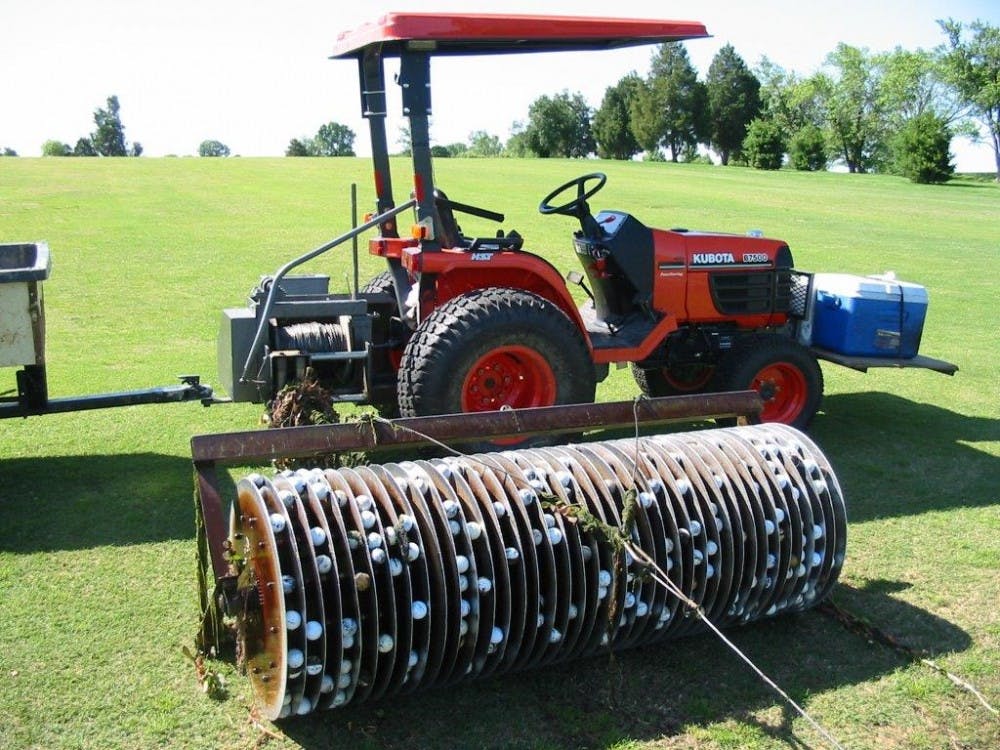Water hazards can frustrate many golfers but for Mark Schmitt, they created a business opportunity.
“It all started when I was 10 and the golf pro caught me swimming in his ponds,” Schmitt said.
Schmitt is the owner of Rawhide Golf Ball Co., a golf ball retrieval business based in Fort Branch, Indiana, that dives for balls and resells them for a fraction of the market price.
In his youth, Schmitt spent his summers at Rolling Hills Country Club, just outside of Evansville, Indiana, fishing golf balls from the sides of ponds and reselling them to the players until the golf pro struck a deal with him.
“I would collect the golf balls and sell them to him instead, where he would wash them and resell them from the shop,” Schmitt said.
That was his first business transaction in 1975. Today, Rawhide Golf deals with over 150 golf courses and driving ranges around Indiana and still does business with the pro shop at Rolling Hills.
For Schmitt’s 16th birthday his parents bought him a scuba diving suit, which allowed him to dive to the deepest parts of the ponds and retrieve more and more balls.
“More balls, equals more money,” Schmitt said.
This led to Schmitt looking for more efficient ways to retrieve golf balls, so he began to build. Schmitt built several models until he perfected what he calls “the roller system”.
This system involves two tractors on either side of the pond connected to a wench and a roller that glides across the bottom of the pond collecting balls.
Schmitt said the roller system collects 90 to 95 percent of the balls in the pond and allows Schmitt to work nine to 10 months out of the year. This is opposed to before, when he could only dive for five months.
“After he created the roller he had to hire me,” Michelle Straw said.
Straw is Schmitt’s secretary and assistant of seven years. She said she was hired after he created his rollers because he saw an influx of over 300,000 balls. Straw is one of three employees at Rawhide Golf Ball Co.
Once the balls are retrieved from the ponds, they are dumped into an acidic wash to remove any dirt from them. Then they are sorted by brand and inspected by Schmitt and Straw.
Balls are given an “A”, “B” or “C” grade depending on quality. “A” balls are sold for half the price, “B” balls are sold for a quarter of the price and so on and so forth, Schmitt said.
Roughly 30 percent of the balls Schmitt harvests are in proper condition to resell, so the other 70 percent of the balls are stripped and sold to driving ranges as practice balls.
Ronald Dingus, a golf pro at Hidden Hills Golf Course, has been letting Schmitt dive in his water hazards for 15 years.
“It just makes a lot of sense financially,” Dingus said. “We let him in our ponds, and he gives us a deal on the balls he sells us.”
Schmitt said business is booming, but it hasn't always been easy.
“Winters are a famine,” Schmitt said.
Schmitt has developed an algorithm in which he can predict when and where the most rounds of golf are played.
Schmitt even has a knack for knowing which kinds of balls are at the bottom of each pond. It depends on if the course is public or private along with other factors like the location of the pond.
“If the hazard is in a tricky spot, the golfer isn't going to use a nice ball,” Schmitt said.
Schmitt has only played one nine-hole round of golf and doesn't care much for it because he fears it will distract him from what he loves most, diving for golf balls.
Apart from snapping turtles and leeches, Schmitt’s biggest concern while diving is water pressure. The deeper you dive, the harder it is to see, and it's easy to become disoriented if you aren’t properly trained, Schmitt said.




